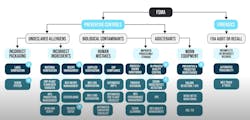The regulatory landscape is changing for food manufacturers with the Food Safety Modernization Act (FSMA) Rule 204 set to be enforced in January 2026. This landmark legislation aims to bolster food safety through advanced traceability requirements and stringent record-keeping. For manufacturers, understanding and preparing for this rule is crucial to ensuring compliance and maintaining the integrity of the supply chain.
Key aspects of FSMA Rule 204
The FSMA Rule 204 focuses on improving the traceability of foods through enhanced record-keeping. The rule mandates that specific data elements be captured and maintained throughout the supply chain, allowing for quick identification and tracing of contaminated foods. This measure is designed to prevent foodborne illnesses by enabling faster removal of potentially harmful products from the market.
Recognizing the importance of this rule is essential for manufacturers. It’s not just about compliance; it’s about safeguarding public health and maintaining trust with consumers. Manufacturers must familiarize themselves with the key requirements and begin implementing the necessary changes now to avoid disruptions once the rule is enforced.
To ensure a smooth transition, manufacturers must be aware of critical dates related to FSMA Rule 204. The enforcement begins in January 2026, but waiting until the last minute to comply could lead to significant challenges. Start by creating a timeline that outlines key milestones, such as internal audits, system upgrades and staff training sessions.
The timeline should include periodic reviews to assess progress and make adjustments as needed. By starting early, manufacturers can spread out the workload, avoid last-minute rushes and ensure full compliance by the deadline. Timely preparation will also allow for the identification and resolution of potential issues before they become major obstacles.
The importance of traceability
Traceability lies at the core of FSMA Rule 204. It enables manufacturers to track the movement of food products throughout the supply chain—from raw materials to finished goods. This capability is vital in swiftly identifying and addressing any points of contamination, thereby protecting consumers and minimizing the impact of recalls.
For manufacturers, investing in robust traceability systems is not just a regulatory requirement; it’s a competitive advantage. Enhanced traceability can improve operational efficiency, reduce waste and strengthen relationships with suppliers and customers. By demonstrating a commitment to safety and transparency, manufacturers can build trust and credibility in the marketplace.
Implementing advanced record-keeping systems
One of the primary requirements of FSMA Rule 204 is maintaining comprehensive records. Food manufacturers must document key data elements, such as lot numbers, dates and locations, at each stage of the production and distribution process designated a critical tracking event by FSMA. This information must be readily accessible and accurate to facilitate rapid traceability.
Transitioning to digital record-keeping systems can streamline this process and ensure compliance. Digital systems offer several advantages, including real-time data capture, automated record generation and ease of access. By adopting these technologies, manufacturers can enhance data accuracy, reduce administrative burdens and improve overall efficiency.
Staff training and education
Educating and training staff is a crucial aspect of preparing for FSMA Rule 204. Employees at all levels must understand the importance of traceability, their responsibilities toward the specifics of the rule and their roles in ensuring compliance. Comprehensive training programs should be developed to cover key topics, such as data entry, record maintenance and emergency response procedures.
Regular training sessions and refresher courses can help keep staff updated on the latest requirements and best practices. Additionally, fostering a culture of food safety within the organization can motivate employees to take ownership of their responsibilities and contribute actively to maintaining compliance.
Supplier collaboration
Compliance with FSMA Rule 204 extends beyond a manufacturer’s internal operations. It requires collaboration with suppliers and partners throughout the supply chain. Manufacturers must work closely with their suppliers to ensure that they are also compliant with traceability requirements and maintain accurate records.
Developing strong relationships with suppliers can facilitate seamless information exchange and ensure consistency in data capture. Manufacturers should communicate their expectations clearly, provide necessary training or resources and conduct regular audits to verify compliance. By working together, supply chain partners can create a unified approach to food safety and traceability.
Internal audits and assessments
Regular internal audits and assessments are essential for ensuring ongoing compliance with FSMA Rule 204. These audits can help identify gaps in current practices, assess the effectiveness of implemented systems and highlight areas for improvement. Conducting these evaluations periodically allows manufacturers to address issues proactively and maintain readiness for external inspections.
Internal audits should cover all aspects of the traceability process, including data accuracy, record-keeping practices, staff adherence to protocols and supplier compliance.
Documenting the findings and implementing corrective actions based on audit results can strengthen the overall traceability system and enhance preparedness for regulatory scrutiny.
Leveraging technology for compliance
Technology plays a pivotal role in achieving and maintaining compliance with FSMA Rule 204. Manufacturers should explore the latest advancements in automated traceability and data management solutions. Advanced technologies, such as machine learning and artificial intelligence offer promising solutions for predictive analytics and risk assessment.
These technologies can analyze vast amounts of data and images to identify patterns and predict potential areas of concern, enabling manufacturers to take preventive measures before issues escalate. Integrating these technological advancements can significantly bolster a manufacturer’s ability to comply with FSMA Rule 204 and improve overall operational efficiency.
Building a culture of continuous improvement
Compliance with FSMA Rule 204 should not be viewed as a one-time goal but as an ongoing process of improvement. Manufacturers should strive to build a culture that values continuous improvement in food safety, traceability and overall quality. Encouraging feedback from employees, conducting regular training sessions, and staying updated on industry best practices are integral to maintaining high standards.
As you prepare for the enforcement of FSMA Rule 204, consider the steps outlined here. Invest in the necessary technology, train your employees, collaborate with supply chain partners, and continuously evaluate and improve your traceability systems. By doing so, you can position your business for success in an increasingly regulated and competitive landscape.
For more information and resources on preparing for FSMA Rule 204, continue to explore industry publications, attend relevant workshops and connect with experts in the field. Grantek, and other CSIA-certified system integrators, are able to help food manufacturers as they prepare for FSMA Rule 204.
Ensuring your readiness today will safeguard your business's future and contribute to a safer food supply for all.
Jim Toman is senior MES advisor at system integrator Grantek.
About the Author
Jim Toman
Lead Consultant--Manufacturing IT, Grantek
Sign up for our eNewsletters
Get the latest news and updates


